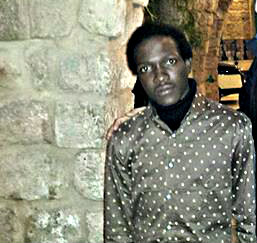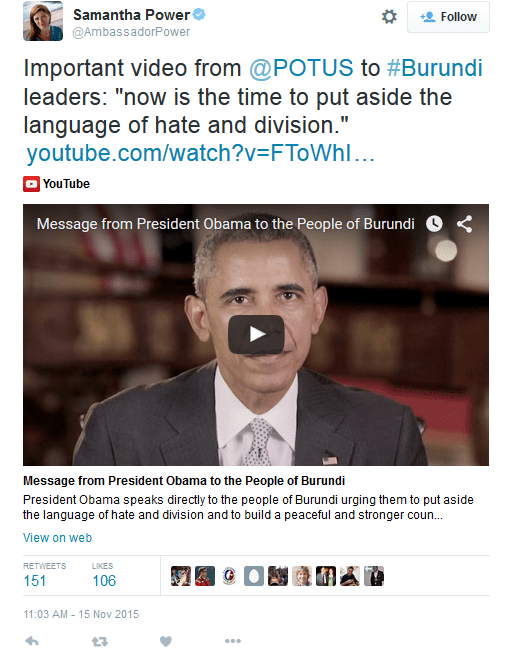Dec 23
20150
Avaaz, Foundations, Imperialist Wars/Occupations, NED | National Endowment for Democracy, Non-Profit Industrial Complex, United Nations, USAID, Whiteness & Aversive Racism
Africa Burundi COLETTE BRAECKMAN LOUISE MUSHIKIWABO Samantha Power UN
SAMANTHA POWER, LOUISE MUSHIKIWABO & COLETTE BRAECKMAN BRING THE DEAD BACK TO LIFE, IN ORDER TO PERPETUATE A LIE
The Intense Western Media Assault on Burundi, its Toxic False-equivalencies & the Lying Mass Murderers Behind It
November 13, 2015
In recent days a fake letter claiming that the FDLR was in Burundi, working with President Nkurunziza to exterminate the Tutsia surfaced out of thin air, and was immediately promoted on social media by Rwandan Foreign Minister Louise Mushikiwabo, Belgian Journalist/Rumour monger Colette Braeckman, and various Burundian opposition figures. This cynical choir of sinister characters claimed that this was the smoking gun they had long waited for, to prove that the FDLR was in Burundi working with President Nkurunziza to kill tutsis. According to these people, this was the final piece that gave President Kagame the right to march into Burundi to set things straight. All that was left, a decision by the UN Security Council,declaring Burundi a property of the UN/US where Kagame can lead his band of looters and pillagers to dispose of as they please. The task to bring this so called compelling evidence to the Security Council was assigned to the US Ambassador to the UN Samantha Power, who has been itching for a fight with Burundi for the last couple of years.Samantha Power
It turns out the letter in question was written on November 4th 2015, by an FDLR Commander by the name of Col. Kabuyoya who passed away several years ago, May He Rest in Peace. Now, unless, the UN wants to accuse the FDLR of running an army of Whitewalkers like in Game of Thrones (an unsettling thought for Kagame who apparently loves the HBO TV show) whereby its fallen soldiers come back to life to fight as fearless ghostly commandos, Col. Kabuyoya did not write any letters. lately; not to his enemies, not to his old comrades, let alone to a sitting President of a Sovereign Country which Burundi is, despite the madness that this trio from hell ( Louise, Samatha and Colette ) may want us to believe. Instead I am of the opinion that, this was supposed to be the equivalent of General Dallaire’s phony genocide fax which was debunked by the International Tribunal, and yet it is still being used by spin doctors such as Mushikiwabo and of course Dallaire himself, as having been a credible piece of evidence that a genocide was planned and executed by the former Rwandan Government.
We have seen this movie before. Now, if you think I am being too tough on the ladies, they weren’t the only ones predicting doomsday for Burundi and calling for President Nkurunziza’s head. Luis Michel, the Belgian loud mouth who claims to know everything about Africa and the Africans took it to the airwaves and he accused President Nkurunziza of being the embodiment of evil leaving nothing to the imagination as to what he would like to see happen to the President, at the same time suggesting that Kagame is the Messiah who is going to deliver the Burundians from a President they just voted for overwhelmingly, just a few months ago, and the same UN that is scrambling to destroy the the President, did recognize his election. And of course, General Dallaire came out from whatever rock he’s been hiding under to give a motivational speech to a unit of the genocidal army (RDF) which he helped bring to power in 1994. The UN Mapping Report clearly states that what the RDF did inside Congo is genocidal in nature and a competent court of law should come to the same conclusion. It is unthinkable to imagine why a General who claims to oppose genocide would go hang out with these type of soldiers. Although his speech is only being promoted by the Kigali media, I can hardly believe his appearance in Africa around the time, the US is trying to coerce the world into taking over a Sovereign country for some mysterious social experiment to be a coincidence. For Dallaire to be back on the scene at this time is like a serial killer who goes back to the scene of the crime to relish in his or her macabre handiwork.
The western mass media assault on Burundi has been so intense that it will take a miracle for the Burundians to overcome the pressure to act out the media predictions, intentionally or unintentionally.
Just like in 1994, the same individuals such as Colette Braeckman, Louis Michel and Dallaire are bent on creating a narrative that only the Government of Burundi is responsible for violent acts, even when we know that a General belonging to the opposition went on TV and claimed responsibility for a string of grenade attacks on civilians inside Bujumbura, terrorist acts by any standard. During the Security Council Meeting, everyone talked about hot political rhetoric from Burundian officials and they forgot to mention Louise Mushikiwabo and her boss’s incitement and threatening speeches against the Burundian government.
For the last two years Burundian opposition figures have used incendiary language meant to raise the specter of calamity, trying every trick in the book to connect the FDLR to the Burundian Government as a way to draw the Rwandese Army into an inter Burundian dispute that started as political and has now reached a point where Kagame threatens to invade and he is cheered on by his old groupies, such as Louis Michel and Colette Braeckman. Rwanda is now home to a Burundian opposition Radio Station that just one week ago ran a broadcast of a Burundian opposition activist who claims that Tutsis are Jews, and that it is their duty to drive the likes of Pierre Nkurunzinza into Congo or Angola or even further South. He goes on to state that if the Tutsis (Jews as he keeps insisting) attack the rest of the Bantus with the aim to subjugate them, Israel will send in a hundred thousand soldiers and heavy weapons to help them wipe out everybody and live happily ever after in a world free of ungodly people.
Louis Michel
This kind of poisonous rhetoric, is going on in synch with multiple propaganda experts going around the world masquerading as human rights activists, using a conciliatory language and blaming all their country’s ills on President Nkurunziza. One such character was on Canadian TV the other day, accusing Nkurunziza of every nasty thing she could think of stopping short of calling him a baby eating monster. She called herself a peace loving mother, then got off TV and headed to a fundraiser where money was collected to buy more grenades to throw into crowded markets into Bujumbura, which of course the likes of Colette Braeckman blame on Nkurunziza without fact checking anything they hear. The Burundian opposition’s double speak is aimed at angering the hutu masses as it was done with Radio Muhabura in the 90’s, and creating international sympathy for their political cause, at the same time creating insecurity within the country, knowing full well that everything is going to be blamed on the Government.
Colette Braeckman
This strategy worked for the RPF to perfection, and as a result the whole region has been in turmoil ever since, and more than 12 million people have lost their lives. Therefore, anyone who claims to care about the region to be engaged in this kind of politics, is outright criminal, and the international actors who are party to this are just as guilty. What is clear to me and most rational people is this: BURUNDI IS NOT RWANDA NOR GERMANY, PRESIDENT NKURUNZIZA IS NOT HITLER AND CNDD-FDD IS NOT THE THIRD REICH, TUTSIS ARE NOT JEWS, HUTUS ARE NOT GERMANS AND THE TIMES OF CONQUEST AND EMPIRE BUILDING HAS LONG PASSED, ANY ATTEMPT TO SUBJUGATE THE PEOPLE BY ANY BODY REGARDLESS OF THEIR FOREIGN BACKERS WILL MEET STIFF RESISTANCE AND IS DOOMED TO FAIL. THOSE WHO BLINDLY TAKE SIDES BEHIND THIS KIND OF POLITICS HAVE NOTHING TO OFFER TO AFRICA BUT PAIN AND SUFFERING/ IT IS UP TO THE BURUNDIANS TO SOLVE THEIR OWN PROBLEMS AND RWANDANS SHOULD SOLVE THEIR OWN PROBLEMS FIRST, BEFORE GETTING INVOLVED INTO BURUNDI.









































